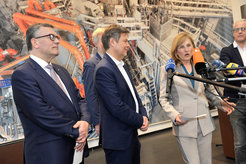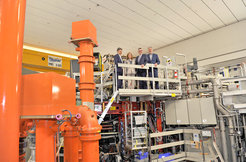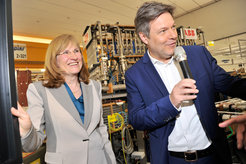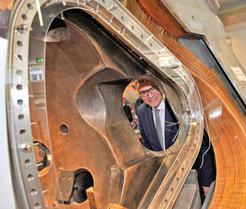Federal Minister of Economics Habeck and Minister of State Herrmann at IPP Garching
Dr Robert Habeck, Federal Minister for Economic Affairs and Climate Action, visited the Max Planck Institute for Plasma Physics (IPP) in Garching today.
Together with the Bavarian State Minister Dr Florian Herrmann, Head of the Bavarian State Chancellery, he was informed about the state of fusion research. The discussion with Scientific Director Prof Dr Sibylle Günter also focused on the contribution of private companies on the way to a fusion power plant.



Federal Minister Dr Robert Habeck: "The field of nuclear fusion is characterised by outstanding engineering achievements coupled with world-class science. Germany is one of the world leaders in fusion research, and areas such as medical technology also benefit from this. Even if fusion research is not yet able to make a contribution to the energy transition, it is important that we keep an eye on all developments with an open technological perspective. Fusion research is already on the verge of industrial development for individual components, although the commercial fusion reactor is not yet within reach."

Professor Dr Sibylle Günter, Scientific Director of IPP: "In the last two years, fusion research has been able to celebrate successes that bring the fulfilment of the dream of an almost inexhaustible energy source within reach, most recently with the world record for fusion energy generated by the JET tokamak announced last week.
With our experiments, we were able to prove that the principles with which we want to generate energy from fusion work. Research is now focused on further optimising the processes, increasing efficiency and developing a technically well-founded design for the overall power plant system.
Nevertheless, we still need at least 20 years before we can have a first functioning fusion power plant, and this will require investments totalling around 20 billion euros."
Minister of State Dr Florian Herrmann: "Nuclear fusion is one of the most important technologies of the 21st century and will provide the energy of the future in the long term: clean, safe and CO2-free electricity. With the 'Nuclear Fusion Masterplan', Bavaria is focussing on solutions through technology and innovation. We are already a European leader in fusion research and want to utilise the great opportunities offered by nuclear fusion. The course is now being set. This will require a joint effort and foresight, including from the federal government, to pave the way for a nuclear fusion power plant."
The German Federal Government presented a power plant concept on 5 February 2024. This is intended to create the framework for investments in modern, highly flexible and climate-friendly power plants that will be able to use hydrogen in the future, the German government announced. In addition, the development of new technologies such as nuclear fusion will be promoted with suitable instruments.
The Bavarian state government launched the implementation of its nuclear fusion master plan at its cabinet meeting on 6 February 2024. The aim is to establish a unique fusion ecosystem with an open-technology approach and the involvement of universities, non-university research institutions, start-ups and industry.



